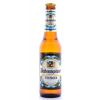Bayerische Staatsbrauerei Weihenstephan - Weihenstephaner Oktoberfestbier
-
ABV:
5.8% -
Serving Temperature:
45-50° F -
Suggested Glassware:
Pint Glass or Mug
Weihenstephaner Oktoberfestbier (also known simply as Festbier in certain markets) pours a brilliant, clear, golden color capped by a nice crop of white foam which retains fairly well before leaving behind some lace as it drops to a persistent collar. Unlike some other Oktoberfest-style beers, which are often very focused on doughy/bready malts, this brew offers a much more balanced approach, and actually leans a bit more towards the hoppy end of the spectrum. The malt presence is there on the nose, offering a bit of a bready, crackery quality, but we found the European noble hops really shine through, presenting a grassy, herbal, and lightly earthy quality bolstered with some notes of lemon pith. Expect a well-balanced beer on the palate, with a fairly substantial core of pils malt offering a touch of honey-like sweetness, while the hops balance with a lemony zing and a spicy herbal character that does a good job of drying out this festbier in the finish. Like all of the Weihenstephaner beers, this one is supremely drinkable; try pairing with grilled spicy sausages, pierogies, pizza, or spicy chicken dishes. Prost!
From the largest hop growing region of the world, in the heart of beer brewing culture and history, comes the multitude of famed Bavarian beers. From these veteran lands springs a timeline of brewing history that has delivered some of the hallmark virtues of beer making as we know them today, and that stretches back in time for at least three thousand years. It’s our pleasure this month to bring you a traditional beer from a brewery which is recognized as not only the oldest in Bavaria, but the oldest operating brewery in the world!
If you traveled back in time to the mid-12th century in Freising, Germany, to the site of Bayerische Staatsbrauerei Weihenstephan (Bavarian State Brewery Weihenstephan)—before the days of Da Vinci, Chaucer or Genghis Khan—you'd be standing in a hop garden that was already 400 years old. Somewhere between the year 725 and 768, this hop garden was planted, and its owner had to pay tithes to the Benedictine monastery of Weihenstephan. In 1040 the monastery was given permission to brew and sell beer in Freising, at the modern day site of the Weihenstephan Brewery. And, they’ve been brewing ever since at the site of this original 8th century hop garden. The Weihenstephan monastery's rights to brew and sell beer passed in 1803 to the King of Bavaria after he purchased the brewery for production of beers for his royal court. Today, it is owned by the Free State of Bavaria and is one of only two breweries to be owned by the state (the other is Munich's famous Hofbrauhaus).
In addition to brewing fantastic beers, the owners also use the brewery to teach the art of brewing to students from around the world, as well as to carry out investigations into the processes and equipment used in practical brewery operations. It's not only science that stands to benefit from this but clearly the beer drinker as well, as all of the brewery’s beers are extremely highly regarded and the brewery has taken home numerous awards over its long history and continues to do so to this day. For more information, visit them at www.brauerei-weihenstephan.de.

Unmatched Variety by style, brewery & country
Choose from Five different Beer Clubs offering unmatched variety by brewery,
country of origin, and beer style to suit your specific tastes.


